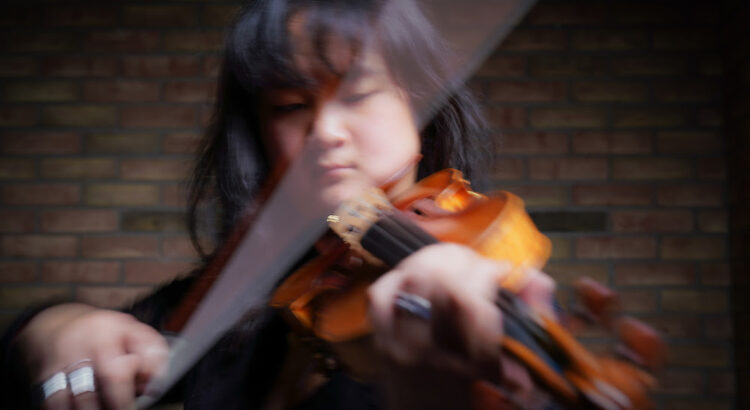November 5th, 2024 | 8:00pm | McIntosh Recital Hall
Election Day is not normally a day I opt to see a recital. Yet, on this particularly tense Tuesday, I dropped into violinist Anda Jiang’s “Duos” at The School of Music. I thought it an interesting theme for this uniquely divided day, and I wondered how it was relevant to the duality we’re facing in the United States currently.
Ms. Jiang programmed five pieces on her recital, all staples of the violin repertoire. The set began with an angsty Zoltán Kodály work, Duo for Violin and Cello, Op. 7 (1914). Jiang performed only the first movement, “Allegro serioso, non troppo“ with cellist counterpart, Lauren Matthews, a technically versatile player with a magnificent buttery sound. The two had a striking musical presence together and masterfully navigated abrupt tone shifts throughout the piece. Kodály knits beautiful melodies alongside overt messaging of tension—the duo is in harmony, and suddenly there’s friction. The piece was composed in 1914, during the brink of WWI in Kodály’s home country of Hungary. Perhaps this sonata contained a response to the growing tensions in the Austro-Hungarian Empire.
The program moved to an effortlessly expressive Schubert, his Fantasie in C Major (1827). Ms. Jiang performed four movements alongside the stunning Rena Wu on the piano. This piece is known to demand extraordinary technicality from both the pianist and the violinist, an ambitious repertoire choice that entirely paid off. Ms. Jiang’s sensitivity to the piece struck me—her ability to take charge with engaging string melodies while leaving adamant space for Schubert’s brilliant contrapuntal piano lines to shine through, especially in the second movement, “Allegretto”.

The penultimate set included Debussy’s La Fille aux Cheaveux de Lin (1910) and Beau Soir (1891), which recruited Lydia Qiu to the piano—hilariously noted on the program as (pianist, mother). This set of two tunes is characterized by sweeping nostalgia and colorful impressionistic sounds, a favorite performance of mine from the evening. In addition to the performing familial duo, Ms. Jiang mentioned that her father built the violin she plays on (how cool!), which houses a stunningly bright and shimmering sound.
Joining the closing piece was dynamic pianist Aleks Shameti, one of the recent winners of the 2024 SMTD Concerto Competition. The two performed one of César Franck’s most well-known compositions, all four movements of the Sonata for Violin and Piano. The piece contains beautiful cyclic themes, opting for a satisfying finish to the set. With an absolutely enchanting performance, I hear a duo full of harmony emotionally and melodically. Funny enough, Franck wrote this piece in 1886 as a wedding gift for the 28-year-old violinist Eugène Ysaÿe, which was premiered publicly with Ysaÿe and pianist Marie-Léontine Bordes-Pène, who performed it first at his wedding. I suppose unity was implied from the beginning.
This recital reminded me why we make music—to comment, to express, to find unity in our strange human experience. Duality exists naturally in life— marriages, disputes, families, and mere instrumentation. On a day like November 5th, the messaging of duality becomes more complex and cynical, when it doesn’t always have to be. I’m not sure if Anda Jiang’s “Duos” was intended to be political commentary or not, but regardless, she reminded me of the sheer power of harmony.
Images thanks to Anda Jiang.


